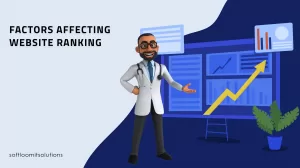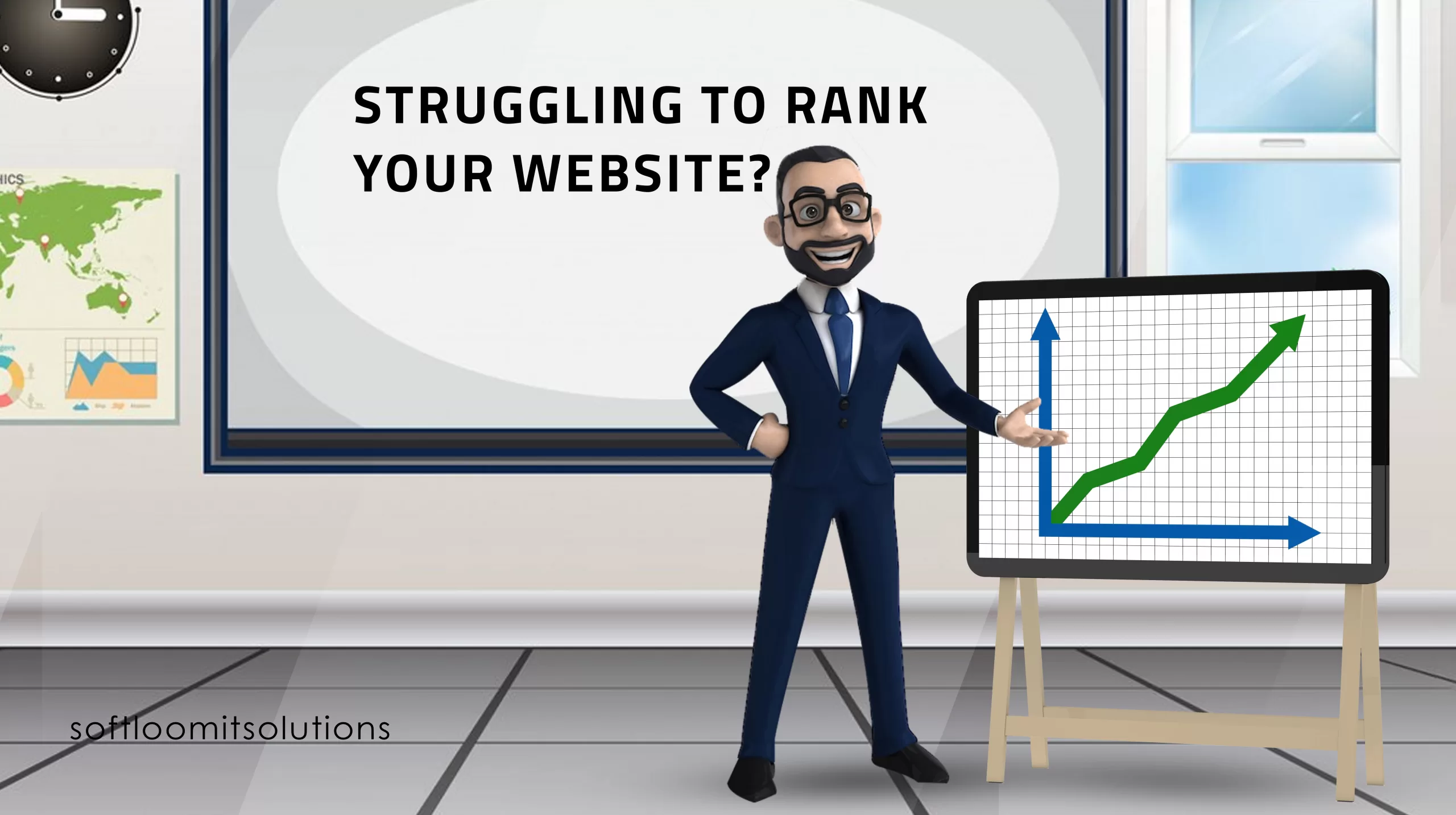The ranking of a website directly impacts how people view it, legislate it, and determine its success. A high ranking increases visibility, traffic, and a competitive advantage over competitors. It fosters user trust and enhances the user experience. Furthermore, it provides worldwide reach and offers affordable organic traffic. By adapting to changing search engine algorithms, website owners can ensure relevance, generate long-term growth, and maximize their return on investment. As a result, optimizing website rankings is crucial to achieving corporate objectives and maximizing online success.
A website that does not rank on search engine results pages (SERPs) for relevant search terms or keywords means it does not appear in the top positions or does not appear at all. As a result, search engines do not significantly index or direct users to this page. When a website’s rankings are low, it can severely reduce its visibility, user base, and ability to generate leads and income, which is not acceptable. In other words, the website lacks proper optimization for search engines or lacks the components to compete in the same field.

Factors Affecting Website Ranking
Search engines use several characteristics to determine how well they rank a website, assessing the quality and relevance of its content. Keeping in mind that search engine algorithms are intricate and dynamic means that these elements can change as time passes. An SEO plan that includes these elements will increase the likelihood of a website ranking better in search engine results. On-page and off-page factors influence webpage rankings.
On-page Factors
In order to determine a website’s search engine ranking, on-page components are crucial. These factors affect the content and structure of a webpage directly. It is possible to make a website both user-friendly and search engine-friendly by implementing these on-page components, as well as offering a seamless and enjoyable experience for visitors.
Quality and Relevance of Content – For a website to rank high in search results, it must be of high quality and value, and address the user’s search purpose. It should also be well-written, authoritative, and informative to build credibility.
Keyword Optimization – When relevant keywords are carefully incorporated into content, headings, and meta tags, search engines understand the topic of the content and how relevant it is to certain queries. Nevertheless, you need to avoid keyword stuffing, as it can negatively affect rankings
Mobile-Friendly and Page Load Speed – A user’s experience is highly dependent on the site’s load time and mobile friendliness. Search engines prefer sites that load quickly and offer an uninterrupted mobile experience.
Title Tag and Meta Description – A good title tag and meta description give relevant and concise information about the content. These factors influence click-through rates from search engine result pages.
Internal linking and URL structure – An effective URL structure and internal linking can enhance the user experience as well as the search engine visibility of your website. As well as aiding search engines in crawling and comprehending the website’s structure and hierarchy, an organized internal linking scheme also helps search engines to crawl and comprehend the website.
Off-page Factors
Off-page factors heavily influence search engine ranking. These external factors depend on how other sites view and interact with the target site, as opposed to on-page variables. By using effective off-page methods, you can improve the exposure, authority, and position of a website in search engines.
Backlink Profile and Quality – When a website has backlinks from reputable relevant sites, you are demonstrating its quality. Since search engines analyze both the quantity and quality of backlinks to determine the authority and reliability of a website, high-quality, natural backlinks have a favorable effect on results.
Social Media Engagement – Website ranking is indirectly affected by social media participation, including likes, shares, retweets, and comments. A piece of content can benefit from increased social involvement in order to gain visibility and organic traffic, thereby improving its search engine ranking.
Online Reputation and Brand Mentions – A good online reputation is influenced by positive brand mentions on the internet. As they value brand authority and recognition, search engines prioritize trustworthy and reputable material for users, which can influence results.
Website Traffic and User Behavior – Search engines measure the relevance and happiness of the information based on click-through rates, bounce rates, and dwell times. It is likely that websites with a higher level of user interaction and long visit times will rank better.
Considerations in local SEO – Consistency in NAP (Name, Address, Phone number), optimization of Google My Business, and local citations all significantly influence local search results.
Common Reasons for Poor Website Ranking
An important objective of any website is to rank highly in search engines, but a number of factors can affect its performance. Identifying and addressing such issues can help website owners and marketers improve their internet presence. Let’s examine a few commonly observed factors that lead to websites not ranking correctly.
Not Using the Right Keywords
Using high-traffic, relevant keywords in your website’s content, meta tags, and headings is critical to ranking well in search engines. Conducting detailed keyword research and carefully integrating these phrases into your website can increase its chances of getting noticed by the right audience. Make it more relevant to search queries, and ultimately improve its overall performance in search engine results.
Google isn’t Indexing Your Site
When your website is not indexed by search engines, particularly Google, it won’t appear in search results. Your website won’t appear in search results if it isn’t indexed. You can remedy this issue by creating backlinks from trusted, already-indexed domains, uploading a sitemap to Google Search Console, and creating backlinks from trustworthy, already-indexed pages on your website. Taking these actions increases the likelihood that search engines will index your website, enhancing its potential for discovery and visibility.
Backlinks from Unreliable Sources
Search engines see backlinks as a sign of your material’s credibility and value when they see them on respectable and authoritative websites. Search engines may perceive your website as less authoritative if it does not have these links, resulting in lower rankings. Establishing a strong backlink profile is essential to increasing search engine exposure and attracting organic traffic. By producing informative content and aggressively pursuing high-quality backlinks, you can increase your website’s authority and ranking in search results.
A Google Penalty has been Issued to your Website
Using black-hat SEO techniques, duplicate content, keyword stuffing, and spammy backlinks are common causes of penalties on your website. Your website could lose rankings or be de-indexed if it breaks Google’s rules. It is important to follow Google’s criteria, create original material of the highest caliber, develop organic backlinks, and avoid manipulative strategies in order to avoid penalties. Using ethical SEO techniques and maintaining a good relationship with Google can enhance search engine rankings.
Content that is not Fresh and Updated
In search results, websites that offer up-to-date and relevant information receive higher ranking, while websites that remain idle may fall out of sight. It positions your website as an authority in your niche and presents it as a trustworthy source of information. New information attracts search engine crawlers, motivating consumers to revisit your website. User-generated content and regular posting can help keep your audience engaged while also maintaining your website’s competitiveness and usefulness to both search engines and users.
Ranking Strategies for Websites
A core objective of any business or website owner who wants to reach a larger audience online is improving website ranking. The implementation of efficient methods in a highly competitive digital environment is crucial to improving search engine exposure and attracting organic traffic. By implementing some proven strategies, website owners can negotiate the complexities of search engine algorithms and position their websites for success online.
- Analyze the most popular and relevant search terms used by your target market.
- Enhance on-page components such as title tags, meta descriptions, headers, and URLs based on the identified keywords.
- Developing a robust backlink profile requires high-quality backlinks from authoritative websites in your field.
- Make social media an integral part of your brand awareness and website traffic strategy.
- Reduce bounce rates and improve user experience by optimizing your website’s navigation, mobile friendliness, and speed.
- Make use of Google Analytics and Search Console to track your website’s traffic, user behavior, and keyword rankings. These tools will enable you to gauge your SEO efforts and pinpoint areas that require improvement.
Softloom excels in providing top-ranking SEO services in Kochi, establishing itself as a renowned choice for websites seeking excellence. With extensive experience serving both national and international clients, Softloom is your trusted partner for tailored solutions that drive digital success.






